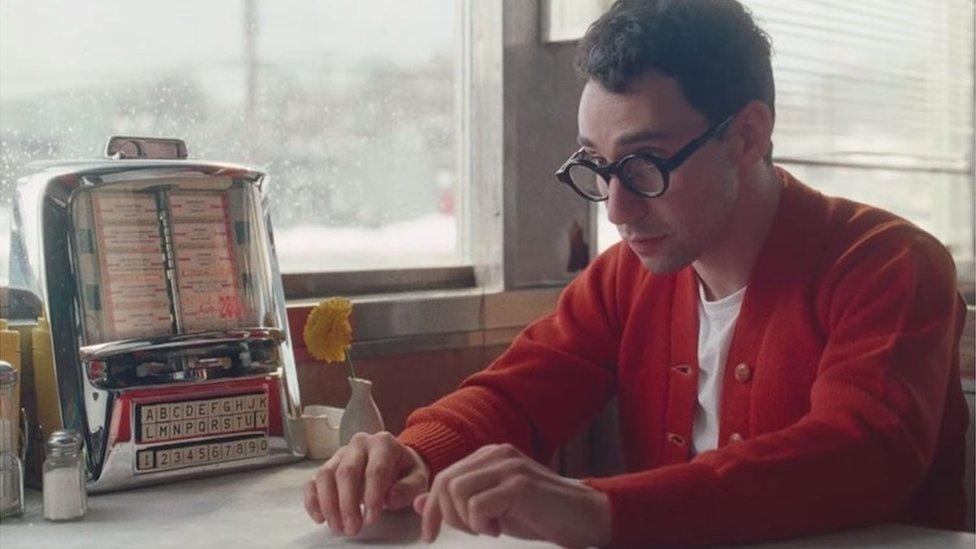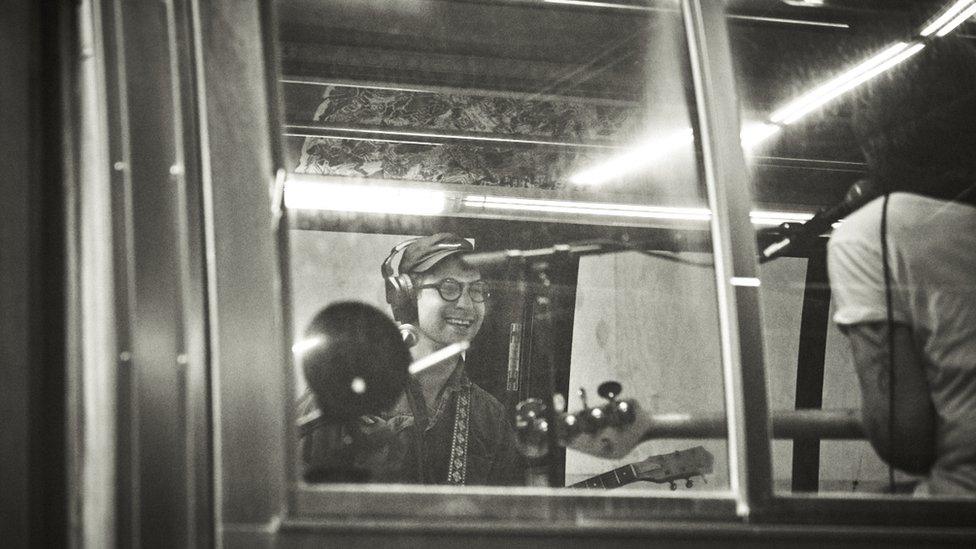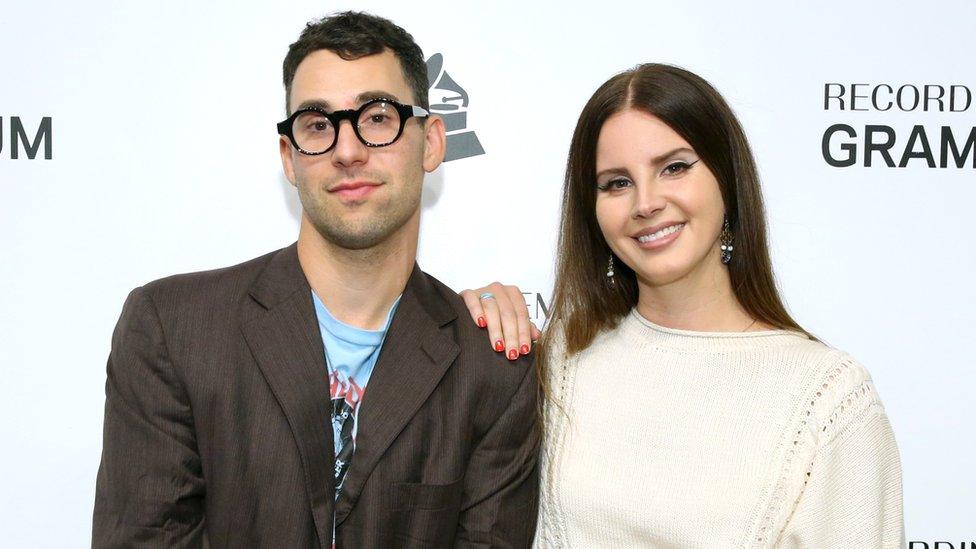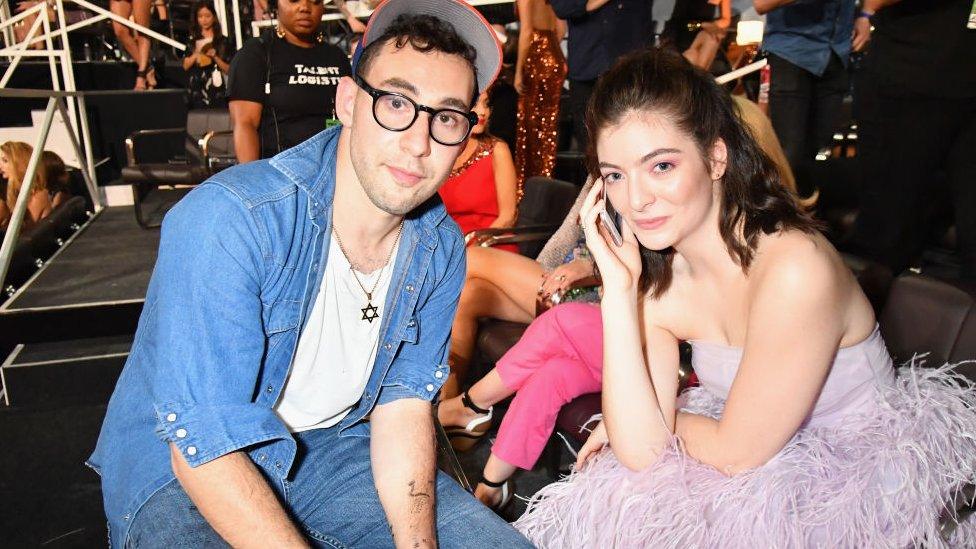Jack Antonoff has redefined pop music. Here's how
- Published

Jack Antonoff: "At the end of the day, you just have to feel excited"
Jack Antonoff's fingerprints are everywhere.
In the last year alone, he's made records with Lana Del Rey, Lorde, St Vincent, The Chicks and Taylor Swift - with whom he shared the Grammy award for album of the year.
Unassuming and earnest, he's become the go-to collaborator for pop's most sophisticated female stars, co-writing and producing records like Swift's Folklore, St Vincent's Masseduction and Del Rey's spectral masterpiece Norman [Expletive] Rockwell.
"Why are they drawn to working with me? I don't know," he says. "I feel like that's a question for them."
So we checked. "He's a wonderful person. He's a joy to work with," is the simple response from Annie Clark, aka St Vincent.
"Jack very much takes my lead," Del Rey told the NME last year, external. "I don't know how it is with him with other people, but he liked for me to know where I was going."
Antonoff has a reputation for generosity and empathy. His laid-back studio demeanour is free of the sexist power games that can sour the relations between male producers and female artists.
The 37-year-old consistently describes his collaborators as friends - even when it's rock icon Bruce Springsteen.
"We were just hanging out," Antonoff says of how Springsteen ended up singing on Take The Sadness Out Of Saturday Night, the third album by his own band, Bleachers. "The friendship led to the collaboration."
Allow YouTube content?
This article contains content provided by Google YouTube. We ask for your permission before anything is loaded, as they may be using cookies and other technologies. You may want to read Google’s cookie policy, external and privacy policy, external before accepting. To view this content choose ‘accept and continue’.
Like Springsteen, Antonoff grew up in New Jersey in a "normal middle-class Jewish family, where we just played baseball and hung out at the house and played guitar".
But things changed forever when his younger sister, Sarah, succumbed to brain cancer at the age of 13.
"So amidst this sleepy, normal existence came this thing that made me feel there was something really different and challenging about my family," he recalls.
"I think everyone deserves a period of their life that feels a little untouchable. And if you're confronted with certain things at a young age, you don't really get that. It's a huge, huge lens through which I remember my childhood and my life."
'Lost in the shuffle'
Antonoff says he has lived with anxiety and depression ever since, and has "written a tonne" about the pain and grief of losing his sister. But he's cautious of ascribing all of his musical impulses to that catastrophic, unimaginable tragedy.
"I always felt misunderstood, and I can't really pinpoint why," he says. "I was supported and loved but I always had this huge thing I was carrying around, like, 'You don't get me, you don't get it.'
"I don't know where that comes from. It could come from being the middle child, or having a younger sick sibling, and there's probably truth to it - getting lost in that shuffle. But I was also fairly shy in those younger years, and maybe [music fulfilled] this need to define oneself."
That's why, when his school friends started cover bands, he preferred to write original songs.
"Some people need to build things to communicate, and I know people who can't feel their existence unless they're being very physical in some kind of way. I've always needed music. I see it as a language."
Allow YouTube content?
This article contains content provided by Google YouTube. We ask for your permission before anything is loaded, as they may be using cookies and other technologies. You may want to read Google’s cookie policy, external and privacy policy, external before accepting. To view this content choose ‘accept and continue’.
After playing in a couple of local bands, Antonoff eventually joined the power-pop trio fun. and co-wrote the single We Are Young.
A global smash, it earned them a Grammy for song of the year in 2013, but Antonoff was already planning his getaway.
"I remember immediately - immediately - feeling like, 'I don't want to play We Are Young when I'm 35,'" he later recalled.
So he formed Bleachers, drawing on his love of 80s pop and college rock. Their music is a strange dichotomy - raucous and thrilling, but with a dangerous riptide of misery below the surface.
Nowhere is that more apparent than on their new album, which interrogates his sadness while seeking a path out of it.
'Cruellest lyric'
The record began in 2019, as Antonoff was coping with the fallout from a major break-up (reportedly from actress and screenwriter Lena Dunham, although he is careful not to name names).
"I found myself in this frustrated place," he says. "It's very easy to leave a period of your life, and it's very hard to enter the next one.
"You can leave anything. You can sell your stuff and walk out the door, but it's very hard to move on. And it's a very uncomfortable place to live, but a very fruitful place to write from."

Bleachers recently played a livestream from a bus crossing the George Washington Bridge
The first track he wrote was Don't Go Dark, a literal account of the end of the relationship, that Antonoff describes as the "angriest, cruellest" lyric he's ever recorded.
"It was a necessary story to tell, because I had this pretty ugly feeling," he says. "Not 'I love you', not 'I hate you', but 'You've got to [expletive] off, you have to leave me alone.' And it was sort of poking at me: 'Write about this, write about this.'
"It's the opposite sentiment to the rest of the album - which is that holding someone's darkness is the ultimate expression of love. But there's the other side to it, relationships where you have to say, 'Do what you want, but I can't hold your darkness.'
"You only have so much space [in your heart] or else you can't move through your life."
It's problematic, he acknowledges, to be exposing these sentiments to the world.
"Writing is the most private thing you could do. You've levelled a bunch of complaints against yourself and the people around you - and when you release it to the world, it always leaves you with a new set of questions like, 'Why do I feel the need to share these things?'
"I think it's probably why a lot of people who do this have a hard time in life, because that doesn't really make sense on paper. You take the most hyper-personal things and throw it out to a bunch of strangers."

"Why do I need to share these things?" Antonoff asks of his more excoriating lyrics
But as tortured as the lyrics get, Antonoff finds balance with some of the most exuberant, catchy melodies of his career. Recorded with his touring band in the midst of the pandemic, the desire to be back on stage is so conspicuous you can taste it.
There's a delicious moment on How Dare You Want More where Antonoff trades riffs with saxophonist Evan Smith - the rest of the band falling back to highlight their duel.
It was a spontaneous moment, that happened to be captured on film in New York's iconic Electric Lady studio.
"I used that film as the backbone of the song," says Antonoff. "For the guitar-sax battle, I overdubbed one or two of my lines but that's the exact live take. If you watch the video, the sax player is exactly just playing it in the moment."
Allow YouTube content?
This article contains content provided by Google YouTube. We ask for your permission before anything is loaded, as they may be using cookies and other technologies. You may want to read Google’s cookie policy, external and privacy policy, external before accepting. To view this content choose ‘accept and continue’.
The live studio sound has become a hallmark of Antonoff's recent productions, from the hushed acoustics of Swift's Folklore and Evermore, to the sweaty 70s funk of St Vincent's Daddy's Home.
The turning point came with Lana Del Rey's Norman Rockwell. Billed as a "folk record with a little surf twist", it saw the musician pivot from the analogue synths and maximalist arrangements he'd become known for.
"There was something about making Norman," he says. "There were just sets of instruments around and we were like, 'Screw it, let's make some sounds. Let's do the opposite of what a lot of the people around us are doing right now. Let's unplug the drum machine.'
"It's funny because that sounds so basic, but at that time it was really groundbreaking."

Antonoff says Lana Del Rey, who also appears on the Bleachers album, is "one of our greatest artists"
The decision has permeated pop - or, at least, the more thoughtful, confessional end of the market.
You can trace a line from Norman Rockwell to the ghostly aesthetics of Billie Eilish's new album, or the acoustic moments on Olivia Rodrigo's Sour (Swift and Antonoff even get a writing credit for their influence on her single Deja Vu).
How does Antonoff feel about influencing a new generation?
"Well, I think we're all in sort of this unconscious conversation where we move together," he says.
"We're kind of pulling each other in different ways. You look for the things that feel shocking. And the idea of shocking isn't as simple as like a crazy modular synth or hitting a metal board with a whip to get your snare sound.
"Sometimes you reach a point where shocking is just playing your drum set and I reached that point. And now I'm actually kind of drifting to a different point."
He won't divulge what that new idea might be - psychedelic flugelhorn? Hardcore polka? A steam-powered mouse orchestra? - but drops a cryptic hint: "You have to swim against the tide enough to find yourself. At the end of the day, you can't really feel excited if you're making things that slot too well into what's already going on."

The producer recently finished work on Lorde's third album, Solar Power
For now, though, he's indulging in the music of his youth. Take The Sadness Out Of Saturday Night revels in the sounds of New Jersey and New York.
You can hear Talking Heads, The Strokes and Blondie lurking in the wings, but it's the reverb-drenched anthems of Bruce Springsteen's E Street Band that take centre stage.
Antonoff even secured that aforementioned feature from Springsteen on the gritty-but-romantic Chinatown, after playing him an early draft of the song.
When The Boss suddenly declared, "Let's go into the studio," Antonoff didn't give it a second thought. "But a couple of days later, I went through it and hearing him take over the second verse really just hit the spot in a pretty intense way."
Rediscovering joy
Reconnecting with New Jersey's most famous son brought the record together thematically too.
Growing up, Antonoff had always wanted to flee the state for its more glamorous neighbour, New York. But as he tried to understand why, post-breakup, he was finding it so difficult to experience joy, he realised the answers all lay at home.
"I got to thinking, is this a Jewish thing? Is it a cultural thing? A generational thing? Why does joy have to come with pain?
"That's in my family - that sort of Holocaust mentality of, 'Don't get too happy, because they're coming.'
"But the problem with that is that the easiest way to have an unadventurous life is to prepare for the worst. And I don't want that. I want to be able to dive out there and just grab things, even if I miss them."
The answer, he discovered, "quite literally entails going back to New Jersey".
"The hallmarks of this album are about taking my sound back home, and looking at the past with less of a dark lens," he adds.
"It's so easy to remember the horrible things. When I was writing this album, I just thought, 'Well what about everything else? It's not worthless.'
"I had to remember that joy is not an embarrassing emotion."